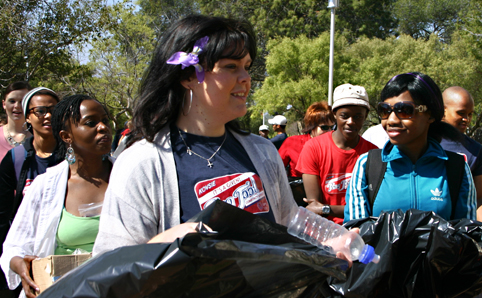|

|
|
Kovsies are not black or white, we are green, says Prof. Jonathan Jansen, our Vice-Chancellor and Rector. Here are some of the students and staff who helped to pick up garbage on our Bloemfontein Campus.
Photo: Leonie Bolleurs
|
A group consisting of students, staff and members of the management team of the University of the Free State (UFS) proved that they are not only talking about sustainability and the importance of keeping the campus clean, but they actually put their words to action by taking up a garbage bag and helping to pick up garbage.
According to Ms Martie Bitzer, Head of the Sustainability Committee of the UFS, the UFS followed the lead of higher education throughout the world by joining the movement for sustainability and took the plunge in addressing sustainability issues with both short- and long-term planning. One of the short-term plans is to make staff and students aware of the importance of a “green” lifestyle. This week’s activities, including the picking up of garbage and planting a tree on the Bloemfontein Campus of the UFS, is the result thereof.
Prof. Jonathan Jansen, Vice-Chancellor and Rector of the UFS, who also helped to pick up garbage, told the group of staff and students that many universities around the world are implementing sustainability initiatives and are keeping their campuses clean, because they care for the environment. He thanked the group for their contribution to this process.
“By cleaning up around us, we show respect towards ourselves and towards our campus,” said Prof. Jansen.
To encourage students to keep the campus clean, Student Affairs at the UFS will launch a competition to see which residence can pick up the most garbage on 8 September 2011. A Clean Thakaneng Bridge Campaign will also be launched later on.